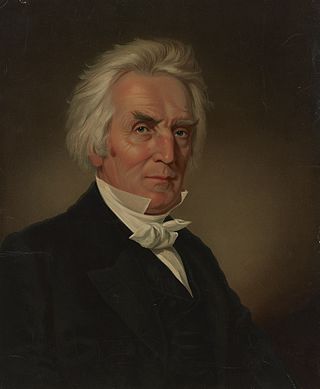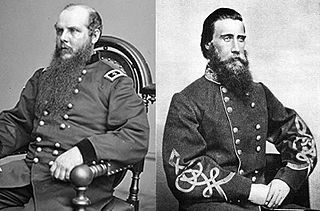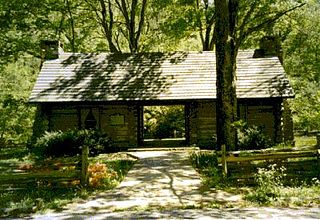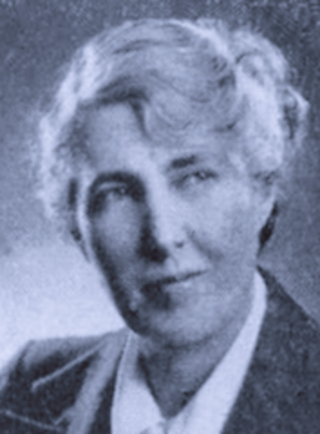
The Christian Church (Disciples of Christ) is a mainline Protestant Christian denomination in the United States and Canada. The denomination started with the Restoration Movement during the Second Great Awakening, first existing during the 19th century as a loose association of churches working towards Christian unity, then slowly forming quasi-denominational structures through missionary societies, regional associations, and an international convention. In 1968, the Disciples of Christ officially adopted a denominational structure at which time a group of churches left to remain nondenominational.

Cheatham County is a county located in the U.S. state of Tennessee. As of the 2020 census, the population was 41,072. Its county seat is Ashland City. Cheatham County is part of the Nashville-Davidson–Murfreesboro–Franklin, TN Metropolitan Statistical Area. It is located in Middle Tennessee.

Scouting in California has a long history, from the 1910s to the present day, serving thousands of youth in programs related to their environments.

Scouting in Indiana has a long history, from the 1910s to the present day, serving thousands of youth in programs that suit the environment in which they live.

Ashland City is a town and the county seat of Cheatham County, Tennessee. Located in Middle Tennessee, it is part of the Nashville-Davidson–Murfreesboro–Franklin, TN Metropolitan Statistical Area. As of the 2020 census, the town's population was 5,193.

Alexander Campbell was a Ulster-Scots immigrant who became an ordained minister in the United States and joined his father Thomas Campbell as a leader of a reform effort that is historically known as the Restoration Movement, and by some as the "Stone-Campbell Movement." It resulted in the development of non-denominational Christian churches, which stressed reliance on scripture and few essentials. Campbell was influenced by similar efforts in Scotland, in particular, by James and Robert Haldane, who emphasized their interpretation of Christianity as found in the New Testament. In 1832, the group of reformers led by the Campbells merged with a similar movement that began under the leadership of Barton W. Stone in Kentucky. Their congregations identified as Disciples of Christ or Christian churches.

The Battle of Franklin was fought on November 30, 1864, in Franklin, Tennessee, as part of the Franklin–Nashville Campaign of the American Civil War. It was one of the worst disasters of the war for the Confederate States Army. Confederate Lieutenant General (LTG) John Bell Hood's Army of Tennessee conducted numerous frontal assaults against fortified positions occupied by the Union forces under Major General (MGEN) John Schofield and was unable to prevent Schofield from executing a planned, orderly withdrawal to Nashville.

Scouts Canada is a Canadian Scouting association providing programs for young people, between the ages of 5 and 26, with the stated aim "To help develop well rounded youth, better prepared for success in the world". Scouts Canada, in affiliation with the French-language Association des Scouts du Canada, is a member of the World Organization of the Scout Movement. In 2021–22, youth membership stood at 33,899, a 48% decline from 64,693 in 2014–15. Over the same period, volunteer numbers also declined 43%, from 20,717 in 2015 to 11,765 in 2022. Scouts Canada has declined significantly in size since its peak: youth membership is down 82% from 288,084 in 1965 and volunteer numbers are down 50% from 33,524 in 1965.

The Battle of Nashville was a two-day battle in the Franklin-Nashville Campaign that represented the end of large-scale fighting west of the coastal states in the American Civil War. It was fought at Nashville, Tennessee, on December 15–16, 1864, between the Confederate Army of Tennessee under Lieutenant General John Bell Hood and the Union Army of the Cumberland (AoC) under Major General George H. Thomas. In one of the largest victories achieved by the Union Army during the war, Thomas attacked and routed Hood's army, largely destroying it as an effective fighting force.

The Battle of Peachtree Creek was fought in Georgia on July 20, 1864, as part of the Atlanta Campaign in the American Civil War. It was the first major attack by Lt. Gen. John Bell Hood since taking command of the Confederate Army of Tennessee. The attack was against Maj. Gen. William T. Sherman's Union army, which was perched on the doorstep of Atlanta. The main armies in the conflict were the Union Army of the Cumberland, commanded by Maj. Gen. George Henry Thomas and two corps of the Confederate Army of Tennessee.

The Battle of Spring Hill was fought November 29, 1864, at Spring Hill, Tennessee, as part of the Franklin-Nashville Campaign of the American Civil War. The Confederate Army of Tennessee, commanded by Lt. Gen. John Bell Hood, attacked a Union force under Maj. Gen. John M. Schofield as it retreated from Columbia through Spring Hill. Because of a series of command failures, the Confederates were unable to inflict serious damage on the Federals and could not prevent their safe passage north to Franklin during the night. The next day, Hood pursued Schofield and attacked his fortifications in the Battle of Franklin, resulting in severe Confederate casualties.

Mount Olivet Cemetery is a 206-acre (83 ha) cemetery located in Nashville, Tennessee. It is located approximately two miles East of downtown Nashville, and adjacent to the Catholic Calvary Cemetery. It is open to the public during daylight hours.

The Franklin–Nashville campaign, also known as Hood's Tennessee campaign, was a series of battles in the Western Theater, conducted from September 18 to December 27, 1864, in Alabama, Tennessee, and northwestern Georgia during the American Civil War.

Benjamin Franklin "Frank" Cheatham was a Tennessee planter, California gold miner, and a general in the Confederate States Army during the American Civil War. He served in the Army of Tennessee, inflicting many casualties on Gen. Sherman at Kennesaw Mountain, Georgia, but took the blame for General Schofield's escape at Spring Hill, Tennessee – a major factor in the Confederate defeat at Franklin, Tennessee.

Craggie Hope, Tennessee is an unincorporated small rural community located on the CSX Transportation railroad line from Nashville to Memphis in southern Cheatham County, Tennessee.

Edith Macy Conference Center is a conference and training facility owned by the Girl Scouts of the USA (GSUSA) and is located in Briarcliff Manor, New York. The facility lies just outside Briarcliff Manor's boundaries, in the town of Mount Pleasant. The site has had four names: Camp Edith Macy (C.E.M.) - University In The Woods, Edith Macy Training School, Edith Macy Girl Scout National Center and since 1982, Edith Macy Conference Center. However, it is often simply referred to as Macy. The John J. Creedon Education Center and Camp Andrée Clark are part of the complex. In 1926, Macy hosted the Girl Guides and Girl Scouts Fourth International Conference.

Montgomery Bell State Park is a Tennessee state park in Burns, Tennessee, United States. The park covers 3,782 acres (1,531 ha) and its official elevation is 758 feet (231 m). However, due to the dissected wooded terrain typical of the Nashville Basin, actual elevations range from 580 feet to 860 feet. The park is open for year-round recreation including boating, hiking, camping, fishing and golf. Montgomery Bell State Park was built during the Great Depression by members of the Works Progress Administration and Civilian Conservation Corps as Montgomery Bell Recreational Demonstration Area. Named for iron industrialist Montgomery Bell, the park is known as the birthplace of the Cumberland Presbyterian Church.

Jessie M. Trout was a Canadian missionary to Japan for nearly 20 years until she left Japan during World War II. She was a leader in the Christian Church, including being the first woman to serve as vice president of the denomination's United Christian Missionary Society. She co-founded the Christian Women's Fellowship (1950) and the International Christian Women's Fellowship (1953), both Disciples groups for women. She also was a writer and translator.
Fannie Battle (1842–1924) was an American social reformer and spy for the Confederate Army.


















